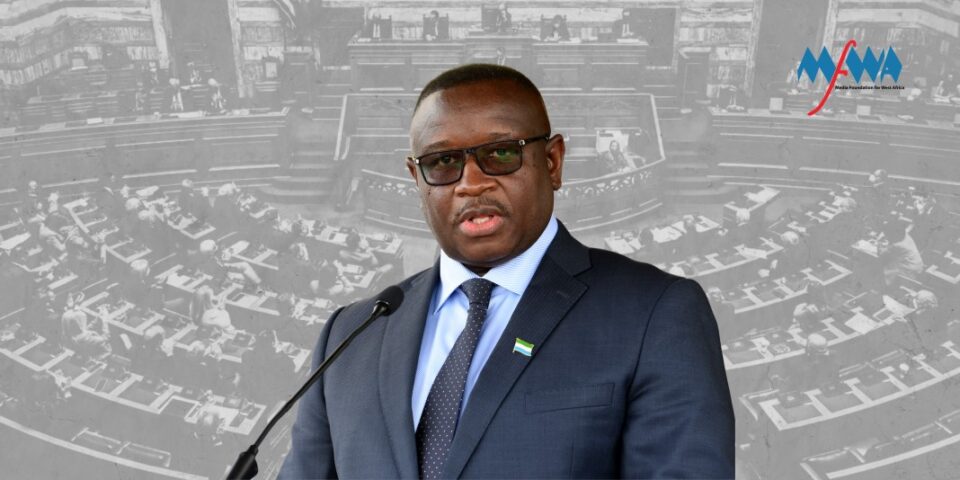Says Media Foundation For West Africa
PHOTO: President Maada Bio of Sierra Leone
Sierra Leone’s new anti-terrorism bill has been touted as a robust legislative response to terrorism in the country. However, buried deep within the proposed Counter-Terrorism Act are provisions that could infringe on freedom of expression rights, civic activism and journalistic independence.
Having carefully gone through the bill, the Media Foundation for West Africa (MFWA) agrees with many concerned stakeholders in Sierra Leone and across the West Africa region that the vague and broad language of some of the provisions of the bill could easily be abused to suppress free expression as has been observed with the cybercrime law.
The MFWA shares in the concern of the Sierra Leone Journalists Association (SLAJ) that the vague and broad language used for some of the clauses, if not revised, could be inimical to press freedom, freedom of expression and civic engagements in the country. Indeed, the provisions, in their current form infringe on international treaties guaranteeing free expression that Sierra Leone is signatory to, and in some cases, has domesticated.
Specific Concerns
Under sections 12, 13, 18 and 19 of the new bill, an outrageous jail term of at least 30 years is prescribed for activities that are very journalistic in nature, including interviewing and quoting alleged terrorists, investigating alleged misconduct by security agencies, and reporting on protests by extremist groups. These provisions indeed restrict journalists in terms of what they can cover, investigate and report on.
Section 21 of the anti-terror bill directly criminalizes the distribution of any publication that may “encourage or induce terrorism,” prescribing a minimum of 25 years in jail as the constituent penalty. By its nebulous and rather open-ended connotation, this section lends itself to whimsical interpretation which can be skewed to attack critical journalism and journalists. The related provision to Section 21, is Section 22 which criminalizes online dissemination of such so-called terrorism inducing publications.
Meanwhile, Section 12 of the bill broadly defines terrorist acts as actions that are “prejudicial to national security or public safety or that, “create fear in a section of the public.” The same Section 12, together with Section 15, criminalizes acts that, “disrupt essential services” or “compel a person to act or refrain from acting.” In other words, journalistic reports about controversial government positions on national issues, corruption, contentious political issues could be mischievously interpreted as causing fear or being prejudicial to national security. Also, journalists report about protests, labour unrests and security-related issues could be accused of falling foul to these sections of the Bill.
The MFWA agrees with SLAJ that there must be a clear distinction between “legitimate journalism and actual terrorist propaganda” in the bill. In line with that, the bill must have clear provisions for the protection of journalists, activists, whistleblowers and human rights defenders.
The MFWA, therefore, joins SLAJ is demanding that the proposed Counter-Terrorism Act, 2024, should be amended to provide clear definitions that distinguish critical reporting from instigation to violent acts. The bill must be amended to introduce exemptions in Sections 21 and 22 for journalists, media professionals, activists and human rights defenders.
Also, the MFWA agrees with SLAJ that there is the need to revise Sections 12, 13, and 21 of the new bill to prevent disproportionate punishment for journalists.
We call on the Sierra Leonian Parliament and other relevant authorities to highly consider all concerns raised by SLAJ, the MFWA and other freedom of expression advocates and revise and/or repeal all the problematic sections as highlighted. The MFWA further calls on the Parliament and relevant authorities to ensure that the review process is participatory and transparent to ensure consensus building in tackling the issue of terrorism in the country.

